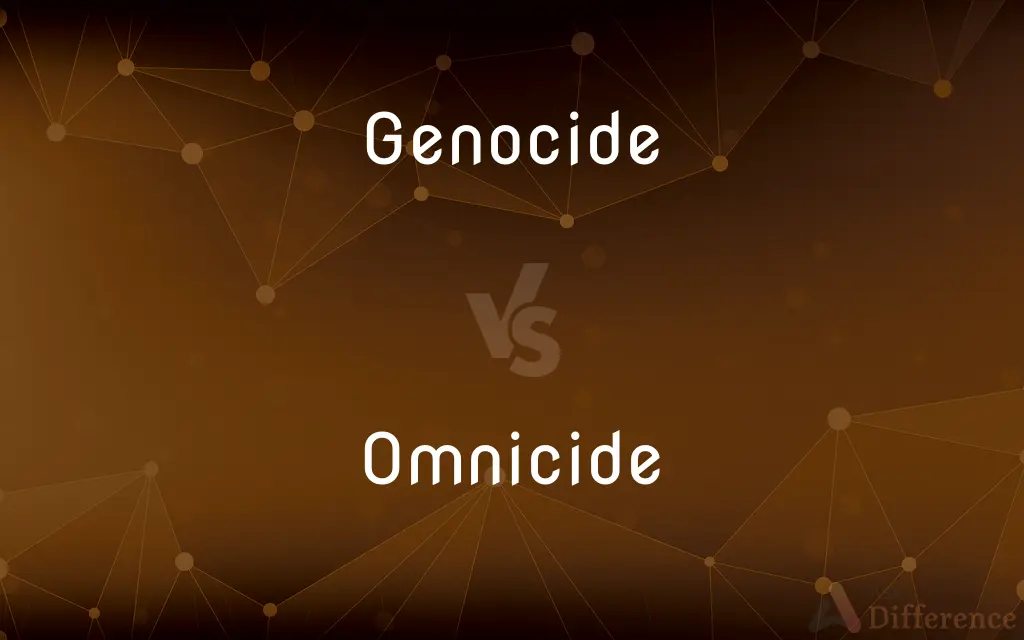Genocide vs. Omnicide — What's the Difference?
Edited by Tayyaba Rehman — By Maham Liaqat — Updated on April 24, 2024
Genocide involves the deliberate killing of a large group of people, especially those of a particular ethnic group or nation, whereas omnicide refers to the total extermination of all humans.

Difference Between Genocide and Omnicide
Table of Contents
ADVERTISEMENT
Key Differences
Genocide is a targeted destruction aimed at a specific group defined by ethnicity, nationality, religion, or race, exemplified by the Holocaust during World War II. Omnicide, on the other hand, encompasses the potential annihilation of all human life, often discussed in the context of nuclear warfare or global catastrophic risks.
The concept of genocide involves intent and actions toward systematic elimination, focusing on a segment of the population. In contrast, omnicide is indiscriminate, threatening the survival of the entire human species without distinction.
Legal frameworks, such as the United Nations Genocide Convention, specifically address genocide, providing definitions and mechanisms for prevention and punishment. Whereas omnicide, while not legally defined, raises ethical and existential questions, influencing global disarmament debates and policies on emerging technologies.
Discussions around genocide often involve historical, socio-political analysis and the responsibilities of the international community to intervene. Meanwhile, omnicide shifts the conversation to a broader existential perspective, considering scenarios like artificial intelligence risks and environmental collapse.
The prevention of genocide is typically pursued through international diplomacy, sanctions, and interventions aimed at protecting vulnerable groups. Preventing omnicide requires global cooperation on issues like nuclear disarmament, biosecurity, and the responsible development of technology to mitigate risks that could potentially end human civilization.
ADVERTISEMENT
Comparison Chart
Definition
Deliberate killing of a large group based on identifiable characteristics like ethnicity or religion.
The total extermination of all human life.
Scope
Targets specific groups.
Targets the entire human species.
Legal Recognition
Defined and prohibited under international law.
Not specifically defined or addressed legally.
Examples
The Holocaust, Rwandan Genocide.
Hypothetical scenarios like global nuclear war.
Prevention Measures
International laws, humanitarian interventions.
Global policy on arms control, technology ethics.
Compare with Definitions
Genocide
Systematic extermination of a racial or cultural group.
The genocide in Rwanda left profound scars on the country.
Omnicide
Linked with existential threats and security.
Biotechnology advances pose both promises and risks of omnicide.
Genocide
A process involving mass killings, serious bodily or mental harm.
Forcible transfers of children were part of the genocidal tactics used.
Omnicide
Theoretical total extinction of humans.
Omnicide could result from unchecked nuclear proliferation.
Genocide
A crime under international law.
Leaders have been tried for genocide at the International Criminal Court.
Omnicide
Ethical and philosophical implications.
Philosophers debate the moral imperatives to prevent omnicide.
Genocide
A focus on ethnic, racial, religious, or national groups.
The Armenian genocide is a tragic part of early 20th-century history.
Omnicide
Not limited to any specific group.
Omnicide is a fear associated with technologies like artificial superintelligence.
Genocide
Acts committed with intent to destroy a specific group.
Genocidal policies during World War II aimed to eradicate Jews and other minorities.
Omnicide
A concept in discussions of global catastrophic risks.
Climate change discussions sometimes touch on the potential for omnicide.
Genocide
Genocide is the intentional action to destroy a people—usually defined as an ethnic, national, racial, or religious group—in whole or in part. A term coined by Raphael Lemkin in his 1944 book Axis Rule in Occupied Europe, the hybrid word geno-cide is a combination of the Greek word γένος (genos, "race, people") and the Latin suffix -caedo ("act of killing").The United Nations Genocide Convention, which was established in 1948, defines genocide as "acts committed with intent to destroy, in whole or in part, a national, ethnic, racial or religious group, as such" including the killing of its members, causing serious bodily or mental harm to members of the group, deliberately imposing living conditions that seek to "bring about its physical destruction in whole or in part", preventing births, or forcibly transferring children out of the group to another group.
Omnicide
The total extinction of the human species as a result of human action. Most commonly it refers to human extinction through nuclear warfare, but it can also refer to such extinction through other means such as global anthropogenic ecological catastrophe.
Genocide
The systematic and widespread extermination or attempted extermination of a national, racial, religious, or ethnic group.
Genocide
The systematic killing of substantial numbers of people on the basis of their ethnicity, religion, or nationality.
A genocide will always be followed by the denial that it ever happened.
Genocide
(by extension) The systematic killing of substantial numbers of people on other grounds.
Genocide
(by extension) The systematic suppression of ideas or practices on the basis of cultural or ethnic origin; culturicide.
Genocide
The elimination of an entire class of monsters by the player.
Genocide
(transitive) To commit genocide (against); to eliminate (a group of people) completely.
Genocide
The systematic killing of a racial or cultural group; as, the Nazi genocide of Jews left few in Germany or Poland after World War II.
Genocide
Systematic killing of a racial or cultural group
Common Curiosities
What distinguishes genocide from other forms of mass violence?
Genocide is specifically targeted at groups identified by certain immutable characteristics, unlike broader forms of mass violence that may be politically or economically motivated.
What is omnicide?
Omnicide refers to the total annihilation of all humans, potentially resulting from catastrophic events or technologies.
Who can commit genocide?
Genocide can be committed by state actors, such as governments, or by non-state actors under certain conditions.
What is genocide?
Genocide is the intentional act to destroy, in whole or in part, a national, ethnical, racial, or religious group.
How is genocide legally addressed?
Genocide is recognized as a crime under international law, with specific treaties like the UN Genocide Convention outlining its prevention and punishment.
Can omnicide be prevented?
Preventing omnicide involves global cooperation on arms control, stringent regulations on high-risk technologies, and international efforts to mitigate environmental risks.
What are the psychological effects of genocide on survivors?
Survivors of genocide often experience profound trauma, loss, and disruptions to their cultural and social fabric.
How do ethical considerations apply to omnicide?
Ethical considerations in preventing omnicide involve the responsibility to safeguard future generations and preserve human existence.
Are there real-world examples of omnicide?
While there are no real instances of omnicide, theoretical scenarios include global nuclear wars or irreversible climate catastrophes.
What role do international courts play in addressing genocide?
International courts prosecute individuals accused of genocide, aiming to provide justice for victims and deter future atrocities.
Is omnicide a topic in international discussions?
Yes, omnicide is discussed in contexts like international disarmament forums, debates on artificial intelligence, and discussions on environmental sustainability.
What preventive measures are suggested for omnicide in technological discussions?
Preventive measures include ethical guidelines for AI development, biosecurity measures, and international cooperation on technology governance.
What are the long-term impacts of genocide on societies?
The long-term impacts of genocide include demographic changes, societal fragmentation, and often prolonged conflicts or grievances.
How is the concept of omnicide used in environmental debates?
In environmental debates, omnicide is used to underscore the potential extreme outcomes of ecological destruction and climate change.
Can genocide occur without direct killing?
Yes, genocide can also involve methods like causing serious bodily or mental harm, deliberately inflicting conditions calculated to bring about a group's destruction.
Share Your Discovery

Previous Comparison
Languid vs. Languish
Next Comparison
Sifu vs. SenseiAuthor Spotlight
Written by
Maham LiaqatEdited by
Tayyaba RehmanTayyaba Rehman is a distinguished writer, currently serving as a primary contributor to askdifference.com. As a researcher in semantics and etymology, Tayyaba's passion for the complexity of languages and their distinctions has found a perfect home on the platform. Tayyaba delves into the intricacies of language, distinguishing between commonly confused words and phrases, thereby providing clarity for readers worldwide.
















































